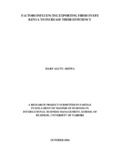| dc.description.abstract | There is a need for management of exporting firms to cope with change, they must
effectively processes and use the right strategy to arrive at major decisions to bring
about change, management must work on the efficiency of the mechanisms utilized
to implement management decisions. The study was set out to determine factors
influencing exporting firms in Kenya to increase their efficiency. The study used both
qualitative and cross-sectional survey key information relevant to the subject matter
will be obtained from the targeted exporting Firm in Kenya with particular interest on
describing efficiency in export. The target population included exporting firms in
Kenya. The study used stratified random sampling procedure to select a sample that
represents the entire population. Sampling stratum was based on the number of export
firm registered with the export process zone authority of Kenya. This includes
manufacturing firms and service providing firms. To ensure an equal distribution of
respondents, the study utilized 12.5% of the population. The total respondent firm was
14 exporting firms in Kenya; one respondent was picked using systematic random
sampling in each of the 14 exporting firms in Kenya. Primary and Secondary data
were used to collect both quantitative and qualitative data. The data was collected
through a structured questionnaire. Secondary sources of data were obtained from the
company records. Data was then analysed using descriptive statistics. The descriptive
statistical tool was used to help the researcher to describe the data with interpretation
in percentages; frequencies mean score and standard deviation. The findings were
presented using tables and graphs for further analysis and to facilitate comparison.
This generated quantitative reports through tabulations, percentages, and measure of
central tendency. The study concluded that the benefits derived from exporting
products were reduced dependency on domestic market, increased market
competitiveness, increased diversification and increased earnings. Further, the study
concluded the factors that were perceived to influence efficiency of exporting firms in
Kenya and other countries were as follows a motivated work force, Government
motivated foreign trade policies, quality management team and effective distribution
channels. Due to time and cost constraints, the study was limited itself to exporting
firms that are concentrated within Nairobi County. It would have been appropriate to
collect data from all the exporting firms across the country in order to draw more
conclusive and detailed results. The study recommends that the Government of Kenya
should formulate policies to reduce taxes imposed on export goods this will encourage
farmers and small and large scale manufacturers to venture into the international
markets to reap more returns. The study recommends that future researchers should
development a time-series database and testing of the relationship between the factors
that enhance efficiency of exporting firms in a longitudinal framework should provide
more insight into probable causation. | en_US |



